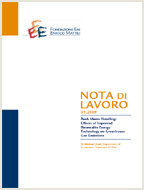Economic Growth and the Environment with Clean and Dirty Consumption

22.06.2011
Carlo Orecchia, Maria Elisabetta Tessitore
C61, Q56, O44
Environmental Kuznets Curve, Economic Growth, Pollution, Consumption, Consumption behaviour
Climate Change and Sustainable Development
Carlo Carraro
This paper aims to verify the existence of the Environmental Kuznets Curve (EKC) or inverted U-shaped relationship between economic growth and environmental degradation in the context of endogenous growth. An important feature of this study is that the EKC is examined in the presence of pollution as a by product of consumption activities; also, pollution is a stock variable rather than a flow and tends to accumulate over time. In order to highlight the role of consumption on the environment, consumers do not consider directly pollution in the maximization problem and are assumed to choose between two different consumption types, characterized by a different impact on the environment (i.e. dirty and clean consumption). We find that substitution of dirty consumption with clean consumption alone is not sufficient to reduce environmental pollution. The result depends on the product differentiation and the cost to achieve it. From a social welfare perspective, more environmental awareness is unambiguously desirable when it generates less pollution. However, it could be that more environmental awareness leads to a lower level of social welfare depending on the costs of product differentiation and social marginal damage of pollution.
